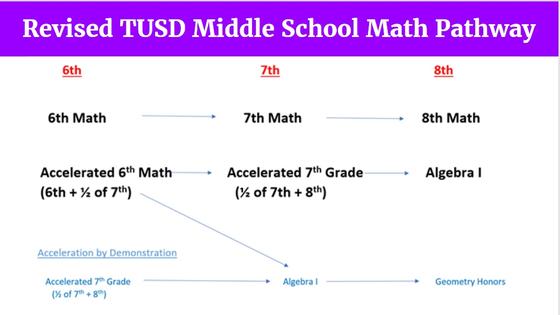Math Pathways


Placement Decisions
Smarter Balanced Assessment:
Math Performance - “Standards Exceeded”
Claims:
- Concepts & Procedures - "Above Standards"
- Problem Solving and Modeling & Data - either “At/Near Standards” or “Above Standards”
- Communication Reasoning - either "At/Near Standards" or “Above standards"
Math Portfolio Tasks - All 4 tasks should be at least “3” in Concepts & Procedures, Strategies, and Communication Reasoning
Teacher Recommendation based on:
- Standards Based Achievement Report
- Standards for Mathematical Practices
- Work ethics, Responsibility, & Maturity
Math Pathway Resources
2017 Parent Night Presentation
Pathway Background
The CCSS-Mathematics build on the skills and knowledge students will need to succeed in college and career.
The CCSS-Mathematics call for greater focus and coherence in mathematics education. Rigorous mathematics refers to a deep understanding of mathematical concepts. These will help students gain strong foundation, including a solid understanding of concepts, a high degree of procedural skill and fluency, and the ability to apply the math to solve problems inside and outside of the classroom.
To help students meet the standards, TUSD teachers are committed to pursue, with equal intensity, three aspects or rigor: conceptual understanding, procedural skill and fluency, and application.
When accelerated pathways are considered, it is recommended that three years of material be compacted into two years, rather than compacting two years into one. The rationale is that mathematical concepts are likely to be omitted when two years of material are squeezed into one. Moreover, the compacted courses should not sacrifice attention to the Standards for Mathematical Practice. “Mathematics is by nature hierarchical. Every step is a preparation for the next one. Learning it properly requires thorough grounding at each step, and skimming over any topics will only weaken one’s ability to tackle more complex material down the road” (Wu, 2012).
Before a student is placed on an accelerated pathway, serious efforts must be made to consider solid evidence of the student’s conceptual understanding, knowledge of procedural skills, fluency, and ability to apply mathematics. Compression is better in later years because students are more mature, they are better able to commit to their choices, and their teachers may have more experience teaching higher level mathematics and/or deeper content knowledge.

